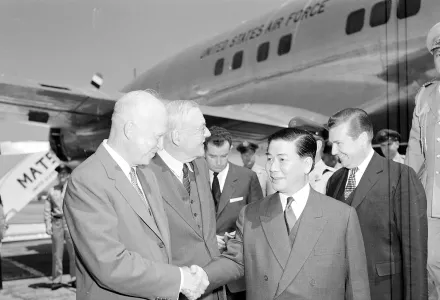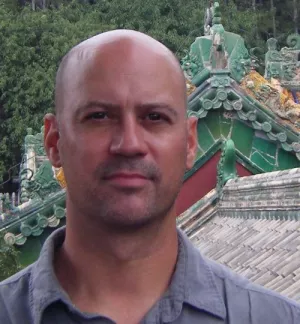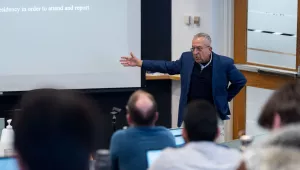
Bernard Fall should definitely be understood in the context of his epoch. So I am wondering how did he approach and perceive other archetypal COIN campaigns of his time — the one in Philippines and the one in Malaya? In the end some of the architects of these particular campaigns, Edward Lansdale as well as Robert Thompson, will exert a big influence over the different stages of the Vietnam campaign.
I agree that the best analysis of Fall demands contextualization of his scholarship and experiences. He did not, nor could he know, everything. It is important to remind readers that Fall died on February 21, 1967 at the age of 40. He definitely was wrong in suggesting that the National Liberation Front might negotiate but, so were others. I would argue, however, that Fall was the most perceptive and important scholar on conflict in Vietnam after War broke out between the French and Viet Minh in 1946 period. This was also acknowledged by others at the time. For example, Senator J. William Fulbright, chairman of the Senate Foreign Relations Committee recorded in the Congressional Senate Record from Feb 24, 1967, only days after Fall's death, stated: "Bernard Fall has played a more important part in the Vietnam War than any other writer. He not only wrote history but also participated in its making; he was a historian who looked to the future as well as to the past."[i] David Halberstam, Peter Arnett, Walter Cronkite, I.F. Stone, and others all looked to Fall as a guiding authority in their journalism and that is consequential when you see the importance of these individuals' writing and scope of influence.
Lansdale and Fall had a complicated and passive aggressive relationship. Fall genuinely admired Lansdale for his effective work in the Philippines in support of Magsaysay, but quickly recognized that Lansdale's relationship with Ngo Dinh Diem was not similar to that Lansdale had with Magsaysay. Diem was not open to Lansdale except when it came to tapping Lansdale for U.S. financial support. Fall and Lansdale's contentious relationship really began over the issue of payments to the Cao Dai, Hoa Hao, and Binh Xuyen for their support of the Diem administration in 1955. Fall believed that Ngo Dinh Diem only received support from these groups through bribery, whereas Edward Lansdale attempted to portray payments to these groups as back-pay for services, thus reflecting a "sincere allegiance" to the Diem administration. Fall described payments, and backed his statements with evidence, that Diem received over 12 million USD from the U.S. by the late Spring 1955 to make these payments to the Cao Dai, Hoa Hao and Binh Xuyen. The bigger strategic issue concerned the fact that these religious groups still revolted against Diem in what is known as the battle of Saigon over that summer. Diem eventually suppressed this revolt and it improved his standing with the U.S. which then threw its full support behind Diem. Lansdale, not surprisingly, did not appreciate Fall questioning Diem's bribery of these religious groups (the Cao Dai and the Hoa Hao) and a criminal syndicate (the Binh Xuyen) because it undermined Lansdale’s portrayal of the Cao Dai and Hoa Hao as supportive of Diem because of their anti-communism.
Fall and Lansdale continued to have a difficult relationship up to 1966. At one point, during a 1966 lecture at the Far East Training Center in Hawaii, Fall claimed that “The Americans have an emotional hang-up on the word 'colonialism.' That's why this place here [Hawaii] wasn't called a colony but a territory, right? Of course, it's six of one, half dozen of another." Lansdale responded to this by writing to a friend: "On Indo-China, I feel strongly that any listening we do to the French (and Bernard Fall in particular) be done with a highly critical ear. The French went from a glorious defeat to a glorious defeat (Indo-China to Algeria), while being highly articulate on how to win a war. It's a bad habit, a contagious one, and all too easy for Americans to catch."[ii] Ironically, both Fall and Lansdale recognized the importance of political strategy in Vietnam and both had problems with the overmilitarized intervention after 1965. They had shared goals but different approaches and how to handle Diem was the single biggest contention between them.
Regarding Malaya and Robert Thompson, Fall recognized that Malaya was as he said it, "one shade closer to the physical environment of the fighting in Vietnam but is totally different in the sociological, political, and ethnic factors to sinning such a battle." He discussed differences between Vietnam and Malaya at length in his book, The Two Vietnams: A Political and Military Analysis published in 1963. His discussion is found in chapter 16 "Insurgency and Myths" which I highly recommend to your readers for Fall's comprehensive thought on revolutionary warfare and the insurgency/counterinsurgency debate as he saw them. Regarding Robert Thompson, Fall only thought of him as "one of the chief authors of Operation Sunrise that swept Vietnamese Communists from the Ben Cat forest in the Cu Chi region near Saigon in the spring of 1962. Fall knew of his experience in Malaya but mostly wrote about him in terms of the strategic hamlets plan in South Vietnam," and, in Fall's perspective, the Strategic Hamlet was not only a complete Sham but it was detrimental to the United States efforts in South Vietnam. He saw it as an extension of President Diem's authoritarian rule that increased support for the National Liberation Front among Vietnamese more than anything else.
Fall occupies a space that is different from later Orthodox views, in which other writers and scholars viewed the war as misguided or immoral, and later Revisionist views through which scholars claimed the war was winnable had it been fought differently or better. Since Fall was a scholar living and analyzing war in Southeast Asia as it was in progress, these competing interpretations were obviously not distinct to him. What is clear is that Fall did view the war as misguided because the North Vietnamese did not pose an existential threat to the United States. Domino theory — thinking was, in my interpretation of how Fall perceived it, more to gain political votes than something to fear. His best articulation of this was "We do not have to fear losing Southeast Asia by losing Vietnam any more than we have to fear losing Europe because we lost Czechoslovakia," and Czechoslovakia, of course, was conceded to the Eastern Bloc in 1958. The mindset Fall demonstrated by stating this was simply not one that Edward Lansdale shared, nor was it shared by probably a vast majority of establishment military personnel. If military leaders want real insight, one lesson from all this, is to accept views that work against the grain and to support junior officers' opportunity to study and promote countervailing views. General H.R. MacMaster and Secretary Mattis are a couple of my favorite leader because of their courage to demand this from junior officers. I wonder how much their being historians has to do with their ability to be openminded, my guess is quite a bit....
Manea, Octavian and Nathaniel L. Moir. "Bernard Fall as an Andrew Marshall Avant la Lettre (Part II)." Small Wars Journal, (December 9, 2019).
The full text of this publication is available via Small Wars Journal.





